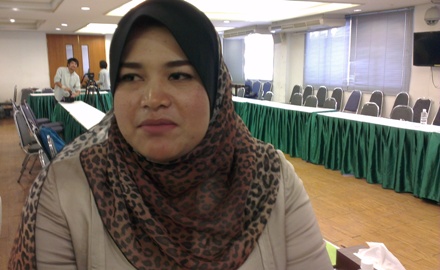There are more problems than just security in the Deep South
The unrest problem in the Deep South is not only confined to ceasefire and troop withdrawal, so said Ms Patimoh Poh-eetae Daoh, chair of the Women for Peace Association, at a seminar held on July 17 at the Thai Journalists Association office.

As one of the panelists, Ms Patimoh explained that, in the perspective of women in the restive Deep South, the unrest problem in the region was rooted in five major causes.
1. Separatism. She claimed that only 20 percent of the people in the region harbour this ambition.
2. Illicit drugs. She said that illicit drugs, especially krathom (a local plant whose leaves contain addictive substance) constituted just 30 percent of all the problems. In some families, she said that the wives had to feed their husbands with water boiled with krathom leaves so that they would not be able to leave home to steal things of their neighbours. In other families, she added that the children also used the drug after having seen their fathers used it.
3. Conflict of vested interests. She claimed that several shootings which occurred in the region were motivated by conflict of interests but officials simply concluded that they were related to security problem so that they would be free from investigating the cases. Also, she said that some families of the victims wanted the cases to be classified as security-related so that they could claim compensation from the state.
4. Oil smuggling. Oil smuggling is a serious problem, she said, adding that most people in the three southern provinces usually do not go to the gas stations to fill up the tanks of their vehicles. But they prefer oil smuggled from Malaysia which is cheaper.
5. Injustice.
Of all the five problems she mentioned, Ms Patimoh said that the government appeared to focus only on the separatism problem which accounts for just 20 percent of the problems. Huge budget was spent to acquire arms and to deploy security forces to tame the separatists but the government seems to have forgotten to address the quality of life problem.
Ms Patimoh complained that no governments from past to present have ever actually accepted the proposals or suggestions made by the people for implementation although they have repeatedly announced that they are receptive to the people’s opinions.
She disclosed that most people in the Deep South have wanted the government to address four problems: illicit drugs, improvement of the quality of education, safety in life and properties and injustice.
Domestic violence is another unreported problem. She disclosed that in some Muslim communities, women who ride on the pillion of a motorcycle driven by a man who is not a family member will be forced to get married. Or any women who are seen leaving home without a head scarf (hijab) will be forcibly shaved.
"I would like to ask is this Thailand. The law does not specify that such acts are an offence, so how come those women were punished?" she asked.
She went on saying that several women in the Deep South were raped or became victims of sexual harassment "but the victims simply could not go the police to file a complaint because this practice is very unusual in our communities."
In most cases, she said that the victimized women would report to the village headmen or community leaders and the solution was that the victims were told to get married with the rapists or their tormentors.
"This problem was covered up and was not known outside but women in the three southernmost provinces are fully aware of it," she said.
Ms Patimoh said she wanted to come up with a policy regarding women in the restive region. Social problem is as serious as security problem and is in bad need to be addressed, she added.
For the past ten years, she disclosed that 393 women had been killed and 1,539 others injured.
"Would the government allow such tragedy to continue?" she asked.
